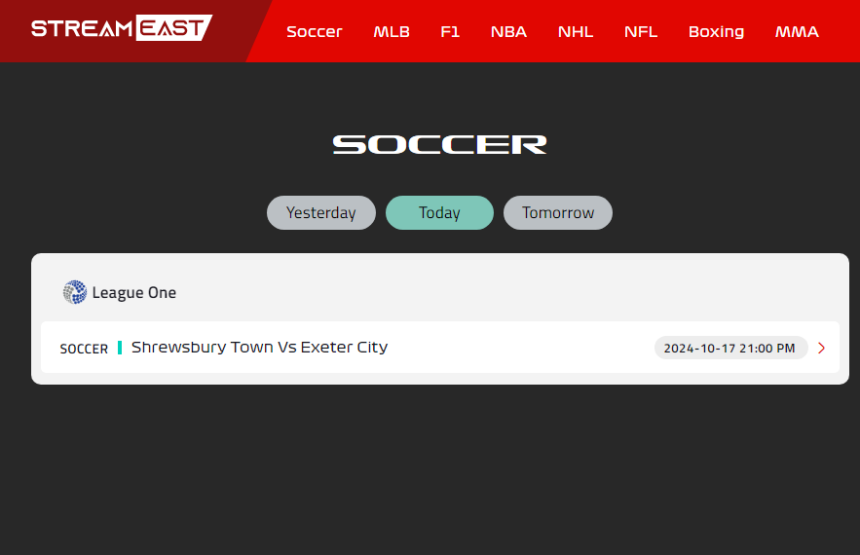In a significant legal action against online piracy, the U.S. government has seized the popular streaming website Streameast. Known for providing free live streams of sports events, including NFL games, NBA matchups, and international soccer matches, Streameast has been a major player in the world of illicit streaming. This article explores what happened to Streameast, the reasons behind its seizure by federal authorities, and the broader implications for the online streaming landscape.
The Rise of Streameast
Streameast emerged as a go-to destination for sports enthusiasts seeking to watch live events without the financial burden of cable subscriptions or pay-per-view fees. The site, which boasted a user-friendly interface and a wide array of live sports coverage, quickly gained traction among users frustrated with traditional, costly broadcasting options. Its appeal was rooted in the fact that it provided high-quality streams for free, attracting millions of viewers who flocked to the site for its extensive sports coverage.
Despite its popularity, Streameast operated in a legal gray area. The site offered access to copyrighted content without the necessary licenses or agreements from content creators and rights holders. This lack of authorization was a significant red flag for the legal and regulatory authorities.
What happened to streameast – The Government’s Legal Action
The seizure of Streameast is part of a broader crackdown on digital piracy by U.S. law enforcement agencies and intellectual property enforcement organizations. The operation, led by the Department of Justice (DOJ) in coordination with the Federal Bureau of Investigation (FBI) and the National Intellectual Property Rights Coordination Center (IPR Center), aimed to curb the illegal distribution of copyrighted content and protect the economic interests of content creators and broadcasters.
Key Reasons Behind the Seizure
- Violation of Copyright Laws: At the core of the government’s action against Streameast is its blatant violation of copyright laws. By streaming live sports events without obtaining licenses from leagues, broadcasters, and rights holders, Streameast was engaging in unauthorized distribution of copyrighted material. This is a serious infringement that undermines the legal frameworks designed to protect intellectual property.
- Economic Impact on the Sports Industry: The unauthorized streaming of sports events has significant financial implications for the sports industry. Broadcasting rights are a crucial revenue stream for sports leagues and networks. When platforms like Streameast offer free access to content that should be monetized through legitimate channels, they directly impact the revenue streams of these organizations. This economic damage extends to the athletes, teams, and associated businesses that rely on these revenues.
- Setting Legal Precedents: The seizure of Streameast also serves as a strategic move to set legal precedents. By targeting high-profile sites involved in large-scale piracy, authorities aim to deter other platforms from engaging in similar activities. This legal action sends a clear message about the consequences of violating intellectual property laws and reinforces the commitment of U.S. agencies to protecting copyright holders’ rights.
The Seizure Process
The seizure of Streameast involved several coordinated legal and technical steps:
- Court Orders and Domain Seizure: Federal authorities obtained court orders to shut down Streameast. This process involved working with domain registrars and internet service providers to disable access to the site. The court orders were necessary to legally dismantle the platform and prevent it from resuming operations under its original domain.
- Technical Measures: In addition to domain seizure, authorities likely targeted the servers and infrastructure used by Streameast. This includes seizing physical equipment and data storage devices that facilitated the streaming operations. Such measures are crucial to ensuring that the site cannot quickly reestablish itself or continue distributing unauthorized content.
- Collaboration with International Agencies: Given that Streameast had a global user base, the operation may have involved collaboration with international law enforcement agencies. This cooperation ensures that the legal action extends beyond U.S. borders and addresses the global nature of online piracy.
Impact on Users
The shutdown of Streameast has immediate repercussions for its users. Many viewers who relied on the site for free sports streaming are now left searching for alternative sources. While some users may turn to legitimate streaming services, others might seek out new, potentially illegal platforms. This shift in user behavior underscores the ongoing challenge of balancing accessibility with legal compliance in the digital age.
Broader Implications for the Streaming Industry
The seizure of Streameast has several broader implications:
- Increased Regulatory Focus: The action against Streameast is part of a larger trend towards increased regulation and enforcement against online piracy. Content creators and rights holders can expect heightened scrutiny and more aggressive legal actions targeting unauthorized distribution.
- Shifts in Consumer Behavior: As illegal streaming sites are shut down, consumers may increasingly turn to legitimate streaming services. This shift could drive growth in subscription-based models and prompt streaming platforms to innovate in order to attract and retain subscribers.
- Advancements in Anti-Piracy Technology: The rise of piracy has led to advancements in technologies designed to detect and block illegal streams. Content providers and tech companies are likely to invest more in developing sophisticated solutions to protect their intellectual property.
Conclusion
The seizure of Streameast marks a significant development in the ongoing battle against online piracy. While the site provided a popular service to its users, its operations were illegal and had substantial consequences for content creators and the sports industry. The U.S. government’s decisive action underscores its commitment to upholding intellectual property laws and protecting the financial interests of content producers.
As the digital landscape continues to evolve, both users and content providers will need to navigate a complex web of legal and technological challenges. The closure of Streameast serves as a reminder of the importance of adhering to legal standards in the ever-expanding world of online streaming.







